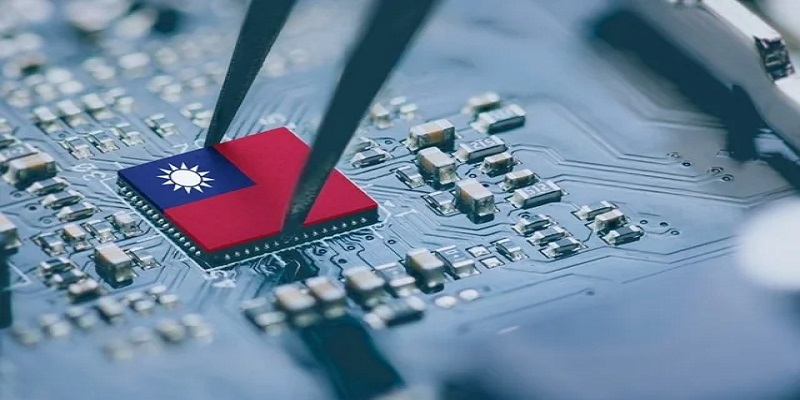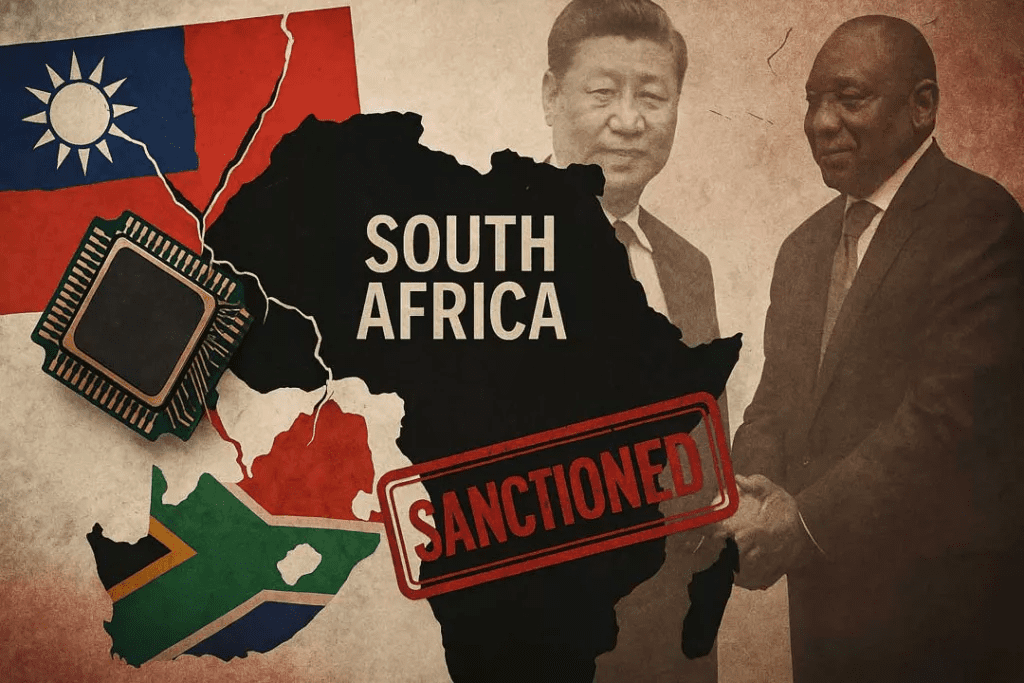Physical Address
60 Ekwema Cres, Layout 460281, Imo
Physical Address
60 Ekwema Cres, Layout 460281, Imo

Taiwan has lifted restraints on the export of semiconductors to South Africa just two days after it imposed them. This sudden reversal shows Taiwan’s cautious approach to using its powerful chip industry as a tool in diplomatic conflicts. The Ministry of Economic Affairs in Taiwan, after consulting with the Ministry of Foreign Affairs, decided to suspend these export controls to allow room for talks with the South African government.
The initial Taiwan restraints on the export of semiconductors to South Africa were announced following Pretoria’s decision to move Taiwan’s liaison office from the capital city, Pretoria, to Johannesburg. Taiwan saw this move as a downgrade of its status and a challenge to its sovereignty. The export controls required companies importing advanced semiconductors to get special approval before shipments could leave Taiwan. This could have seriously affected key South African industries like automotive manufacturing, industrial automation, and artificial intelligence development.
Read Next: Egypt’s Instabug Rebrands as “Luciq” to Better Represent Its Range of Products
South Africa quickly responded to the restrictions by calling for negotiations over the status of Taiwan’s office. After talks between the two governments, Taiwan lifted the restrictions, opting to suspend the export controls while diplomatic discussions continue. This move reflects Taiwan’s dilemma in balancing its role as the world’s leading supplier of semiconductors with the diplomatic issues at hand.

Taiwan is a global leader in semiconductor production, supplying over 60% of the world’s semiconductors and more than 90% of the most advanced chips used in AI systems, electric vehicles, and electronics. Using chip exports as a diplomatic weapon can pressure other countries, but it also risks disrupting global supply chains and drawing international political attention. The recent suspension of Taiwan’s restraints on the export of semiconductors to South Africa shows the country’s hesitation to escalate tensions by disrupting critical technology flows.
Taiwan’s Foreign Ministry had said the restrictions were meant to protect national dignity. Philippe Yen, Director-General of the Department of West Asian and African Affairs in Taiwan, commented earlier that the government would coordinate with trade authorities to enforce measures to safeguard sovereignty. However, the quick reversal after the South African government’s call for talks highlights Taiwan’s preference to use the chip industry as a diplomatic lever carefully, without causing unnecessary disruptions.
The restrictions caused concern in South Africa, where advanced semiconductors play a vital role in industries moving toward automation and electric vehicles. Vehicle assembly plants rely on chips for supply chains, sensors, and electrical systems. Interruptions in chip supply would have slowed industrial projects and economic growth, especially important as South Africa prepares to host the G20 summit in November. Experts warned that even short-term disruptions could have a lasting impact on companies producing AI, robotics, and intelligent infrastructure.
South Africa’s move to relocate Taiwan’s liaison office aligns with its commitment to the “One China” policy, recognizing Beijing as China’s sole representative in international affairs per UN Resolution 2758. While South African officials called it a routine administrative change, it was viewed globally as a diplomatic downgrade, seen as aligning more closely with China. Taiwan condemned the action as a challenge to its sovereignty.
By lifting the chip export controls, Taiwan is trying to ease tensions without losing the option to reapply restrictions if negotiations fail. The suspension does not cancel the restrictions but pauses them for now to give both countries time to negotiate a compromise. This situation highlights how semiconductors have shifted from basic factory components to powerful political tools.
Taiwan’s decision to pause the controls opens a space for dialogue. Both Taiwan and South Africa now have the chance to find a way to address Taiwan’s concerns about the liaison office’s status, while avoiding trade measures that could harm businesses in each country. Meanwhile, South African companies are expected to keep plans ready in case export controls come back. Industry groups have urged Pretoria to secure reliable access to advanced semiconductors, warning that any disruptions would damage vital economic sectors.
Globally, this incident shows the growing connection between technology and diplomacy. Semiconductor supply chains are key to trade, national security, and foreign policy. Tensions like these have appeared before in relations between Taiwan and China, the US and China, and between the US and Europe over chip production and exports.
Read Next: Kenyan Lending Startup Zanifu Gets Funding from Yango Ventures
For Taiwan, this episode tests how well it can protect its sovereignty using its critical role in the global technology market. For South Africa, it reveals the costs of foreign policy choices when advanced technology access is crucial for economic growth. As talks continue, the world watches closely because the outcome will have effects far beyond Taiwan and South Africa. It could set a new example for using Taiwan’s semiconductor power as a diplomatic tool in the future.
In summary, Taiwan has lifted restraints on the export of semiconductors to South Africa, just two days after imposing them, showing restraint and a willingness to negotiate. The situation underscores the importance of Taiwan’s semiconductor industry in global trade and geopolitics, and highlights the delicate balance between defending sovereignty and maintaining vital technology supply chains.
Was this information useful? Drop a nice comment below. You can also check out other useful contents by following us on X/Twitter @siliconafritech, Instagram @Siliconafricatech, or Facebook @SiliconAfrica.